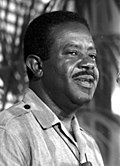Black church
(Redirected from Black Church)
Black Church
The Black Church refers to Christian churches that have predominantly African American congregations. These churches have played a significant role in the history and culture of African Americans in the United States. The term "Black Church" is often used to describe Protestant churches that were established by African Americans, for African Americans, and have historically been a center of community life, social activism, and spiritual guidance.
History
The origins of the Black Church can be traced back to the late 18th century, during the period of slavery in the United States. African Americans, both enslaved and free, began to form their own congregations and religious practices, often in secret, as a response to the racial segregation and discrimination they faced in predominantly white churches.
Early Beginnings
The first independent Black denomination was the African Methodist Episcopal Church (AME), founded in 1816 by Richard Allen in Philadelphia. This was followed by the establishment of the African Methodist Episcopal Zion Church (AME Zion) in 1821 and the Christian Methodist Episcopal Church (CME) in 1870.
Growth and Expansion
During the Great Migration in the early 20th century, millions of African Americans moved from the rural South to urban areas in the North and West. This migration led to the growth of Black churches in cities such as Chicago, Detroit, and New York City. The Black Church became a vital institution in these communities, providing spiritual support, social services, and a platform for civil rights activism.
Role in the Civil Rights Movement
The Black Church played a pivotal role in the Civil Rights Movement of the 1950s and 1960s. Many Black churches served as meeting places for civil rights activists and were led by influential leaders such as Martin Luther King Jr., who was a Baptist minister. The church provided moral and spiritual support for the movement and was instrumental in organizing protests, marches, and voter registration drives.
Cultural and Social Impact
Beyond its religious functions, the Black Church has been a center for cultural expression and social change. It has influenced various aspects of African American culture, including music, art, and literature. Gospel music, which originated in Black churches, has had a profound impact on American music as a whole.
Contemporary Issues
Today, the Black Church continues to address issues facing African American communities, such as economic inequality, racial injustice, and health disparities. It remains a source of empowerment and advocacy, while also adapting to the changing needs of its congregants in the 21st century.
Notable Denominations
- African Methodist Episcopal Church (AME)
- African Methodist Episcopal Zion Church (AME Zion)
- Christian Methodist Episcopal Church (CME)
- National Baptist Convention, USA, Inc.
- Church of God in Christ (COGIC)
See Also
References
Further Reading
- Lincoln, C. Eric, and Lawrence H. Mamiya. The Black Church in the African American Experience. Durham: Duke University Press, 1990.
- Raboteau, Albert J. Slave Religion: The "Invisible Institution" in the Antebellum South. Oxford University Press, 2004.
Transform your life with W8MD's budget GLP-1 injections from $125.
W8MD offers a medical weight loss program to lose weight in Philadelphia. Our physician-supervised medical weight loss provides:
- Most insurances accepted or discounted self-pay rates. We will obtain insurance prior authorizations if needed.
- Generic GLP1 weight loss injections from $125 for the starting dose.
- Also offer prescription weight loss medications including Phentermine, Qsymia, Diethylpropion, Contrave etc.
NYC weight loss doctor appointments
Start your NYC weight loss journey today at our NYC medical weight loss and Philadelphia medical weight loss clinics.
- Call 718-946-5500 to lose weight in NYC or for medical weight loss in Philadelphia 215-676-2334.
- Tags:NYC medical weight loss, Philadelphia lose weight Zepbound NYC, Budget GLP1 weight loss injections, Wegovy Philadelphia, Wegovy NYC, Philadelphia medical weight loss, Brookly weight loss and Wegovy NYC
|
WikiMD's Wellness Encyclopedia |
| Let Food Be Thy Medicine Medicine Thy Food - Hippocrates |
Medical Disclaimer: WikiMD is not a substitute for professional medical advice. The information on WikiMD is provided as an information resource only, may be incorrect, outdated or misleading, and is not to be used or relied on for any diagnostic or treatment purposes. Please consult your health care provider before making any healthcare decisions or for guidance about a specific medical condition. WikiMD expressly disclaims responsibility, and shall have no liability, for any damages, loss, injury, or liability whatsoever suffered as a result of your reliance on the information contained in this site. By visiting this site you agree to the foregoing terms and conditions, which may from time to time be changed or supplemented by WikiMD. If you do not agree to the foregoing terms and conditions, you should not enter or use this site. See full disclaimer.
Credits:Most images are courtesy of Wikimedia commons, and templates, categories Wikipedia, licensed under CC BY SA or similar.
Contributors: Prab R. Tumpati, MD









